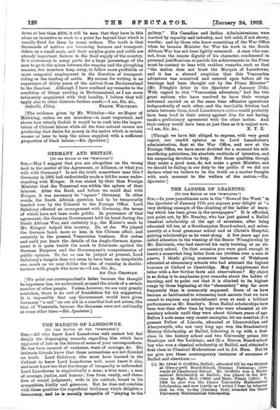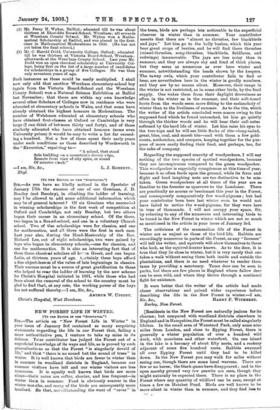THE LADDER OF LEARNING.
(To THE EDITOR OP THE "SPECTATOR.") SIR,—In your penultimate note in the "News of the Week" in the Spectator of January 17th you express your delight at "a very striking example of the climbing of the ladder of learn- ing which has been given in the newspapers." It is afforded, you point out, by Mr. Beazley, who has just gained a Balliol classical "scholarship at the age of seventeen, after being educated till ten at a Southampton Board-school, and subse- quently at a local grammar school and at Christ's Hospital, gaining scholarships as he went along. A few years ago you
called attention to the winning of the Senior Wranglerahip by Mr. Entwistle, who had received his early training at an ele-
mentary schooL On that occasion you were good enough to insert a somewhat long letter from me (written over a nom de guerre, I think) giving numerous instances of Welshmen educated at elementary schools who had attained the highest
honours at Oxford or Cambridge. May I supplement that letter with a few further facts and observations P My object in so doing is to emphasise your remarks about the ladder of learning, and to point out that it is climbed to its highest rungs by those beginning at the " elementary" step far more frequently than is commonly supposed. Some of us have become so habituated to witnessing such ascents that we have ceased to express any astonishment even at such a brilliant performance as Mr. Beazley's. Even Balliol scholarships have been won time after time by boys who were educated at ele- mentary schools until they were about thirteen years of age.
Before I note some very recent examples, let me mention (11a present Fellow of Lincoln, educated at Llanuwchllyn and Aberystwyth, who not very long ago won the Brackenbury
History Scholarship at Balliol, following it up with a first• class in the history school and two University prizes (the Stanhope and the Lothian); and (2) a Brecon Board-school boy who won a classical scholarship at Balliol, and obtained a first•class in Classical Moderations and in Lit. Hum. But let me give you these contemporary instances of successes at Balliol and elsewhere :- (1) Mr. Idwal 0. Griffiths, Balliol ; educated till he was thirteen at Glan-y-pwll Board-School, Blaenau Festinieg ; after- wards at Llandovery School. Mr. Griffiths won a Mathe- matical Scholarship at Balliol ; was placed in the first class in Math. Mod. (1899) and Math. Finals (1901). In 1899 he also won the Junior University Mathematical Scholarship, and now (verily as I write) I hear by telegrsm that he was to-day (January 21st) awarded the Senior University Mathematical Scholarship.
(2) Mr. Percy H. Wykes, B& liol ; educated till he was about thirteen at Rhos-ddu Board-School, Wrexham; aft erwards at Wrexham County School. Mr. Wykes won a Mathe- matical Scholarship at Ralliol, and was placed in the first- class in Mathematical Moderations in 1900. (He has not yet taken the final school.)
Mr. C. Harold Dodd, 17ni.versity College, Oxford; educated till he was thirteen at Victoria Board-School, Wrexham ; afterwards at the Wrex'ham County School. Last year Mr. Dodd won an open classical scholarship at University Col- lege, being first on the List of a large number of candidates for scholarships in a group of five Colleges. He was then only seventeen years of age.
Such instances as these could be easily multiplied. I shall now only add that another Wrexham elementary-school boy (again from the Victoria Board-School and the Wrexham County School) won a Natural Science Exhibition at Balliol last November; that there are within my own knowledge several other Scholars of Colleges now in residence who were educated at elementary schools in Wales, and that some have already obtained the highest honours in Moderations. The number of Welshmen educated at elementary schools who have obtained first-classes at Oxford or Cambridge is very large (I can think of between thirty and forty), and of those similarly educated who have obtained honours (some even University prizes) it would be easy to write a list far exceed- ing a hundred. Not a few of these spent their early years under such conditions as those described by Wordsworth in
the "Excursion," repairing to—
"A school, that stood
Sole building on a mountain's dreary edge, Remote from view of city spire, or sound
Of minster c'kock." •







































 Previous page
Previous page